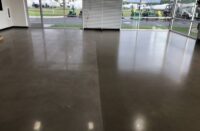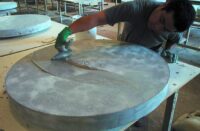Characteristics of concrete sealers vary depending on the specific formulation, but typically the following applies to these most commonly used concrete sealers:
Acrylic sealers
- Film-forming
- Typically UV stable
- Solvent-based formulas have a glossy, colorenhancing sheen
- Water-based formulas not as shiny, but sheen can be built up in layers
- Can be tinted
- Provide relatively good protection
- Good adhesion to concrete
- Easy to apply and repair
- Inexpensive and easy to obtain
Epoxy sealers
- Film-forming
- Aesthetically very pleasing; available in colors
- Glossy finish
- More durable than acrylics
- Excellent chemical resistance
- Aromatic versions are not UV stable; aliphatic versions are UV stable
- Requires careful preparation and application, but generally good bonding
- Can be very expensive
Urethanes
- Film-forming
- Very glossy finish
- Provides a hard, durable surface
- Excellent chemical resistance
- Aromatic versions are not UV stable; aliphatic versions are UV stable
- May have bonding problems
- More expensive than acrylics
Silanes/Siloxanes
- Penetrating (reactive)
- Don’t change surface appearance; no gloss
- Excellent water repellency
- Easy to apply
- Twice as much as acrylics












